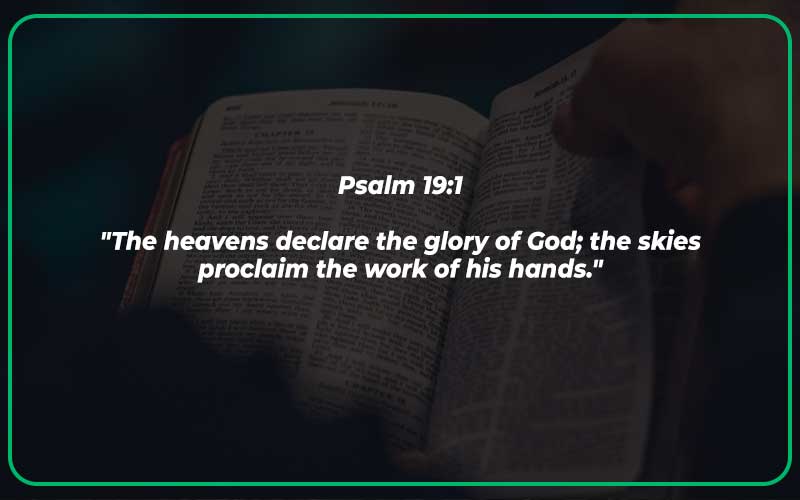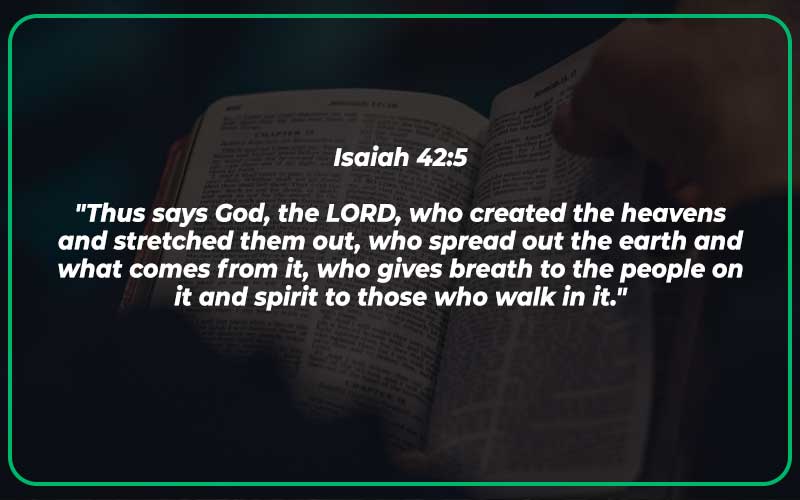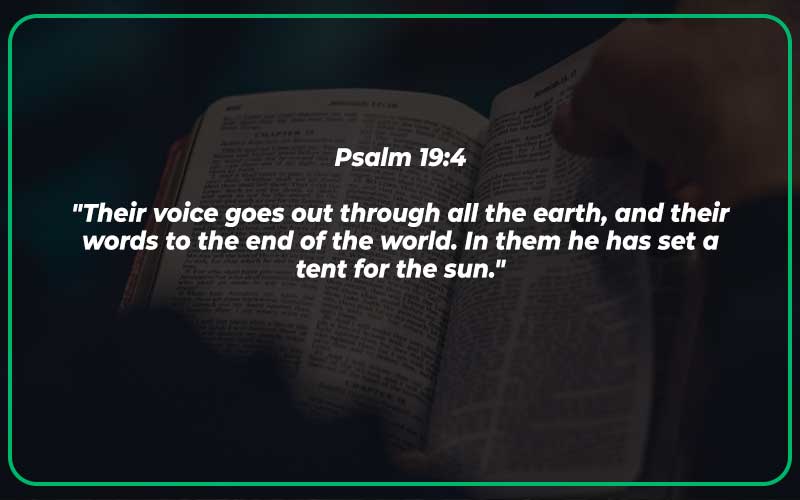The exploration of space, the universe, and celestial bodies has captivated the human imagination. While the Bible doesn’t explicitly discuss the vastness of space or scientific details, it points to God as the Creator of the heavens and the earth.
These verses inspire us to marvel at God’s handiwork and acknowledge His sovereignty over the universe. As we explore these verses, we are invited to embrace a sense of wonder and awe at the mysteries of the cosmos. Let’s delve into these verses that remind us of the greatness of our Creator and His vast creation.
Bible Verses About Space
Genesis 1:1
“In the beginning, God created the heavens and the earth.”
This iconic verse marks the beginning of the Bible, emphasizing that God is the creator of the entire cosmos—both the heavens and the earth. It highlights the divine origin and authority over all things, including space.
Psalm 19:1
“The heavens declare the glory of God; the skies proclaim the work of his hands.”
This verse beautifully captures the awe-inspiring nature of the heavens. It suggests that when we observe the vastness, intricacy, and splendor of the celestial bodies, we witness a testimony to God’s glory and the craftsmanship of His creation.

Job 26:7
“He stretches out the north over empty space; he suspends the earth on nothing.”
In this verse, Job acknowledges God’s power and sovereignty over space and the earth. It emphasizes that God’s control extends even to the vast and seemingly empty expanse of space, where He orchestrates the positioning and balance of celestial bodies.
Isaiah 40:26
“Lift up your eyes on high and see: who created these? He who brings out their host by number, calling them all by name; by the greatness of his might and because he is strong in power, not one is missing.”
This verse highlights God’s magnificent role as the creator and sustainer of the heavenly bodies. It assures us that every star, planet, and celestial entity has been intentionally designed and named by God Himself, showcasing His unfathomable power and meticulous attention to detail.
Psalm 147:4
“He determines the number of the stars; he gives to all of them their names.”
God’s infinite knowledge and understanding are emphasized in this verse. It reveals His intimate involvement in the vastness of space, as He not only determines the number of stars but also assigns them individual names—a testament to His limitless wisdom.
Job 9:8
“He alone stretches out the heavens and treads on the waves of the sea.”
Here, Job acknowledges the exclusive authority of God in stretching out the heavens. It portrays God’s dominion over both the celestial realm and the earthly realm, displaying His omnipotence and ability to govern all aspects of creation.
Psalm 8:3-4
“When I look at your heavens, the work of your fingers, the moon and the stars, which you have set in place, what is man that you are mindful of him, and the son of man that you care for him?”
These verses reflect the awe and humility evoked by contemplating the vastness of space in comparison to humanity’s seemingly insignificant presence. They highlight the paradoxical truth that God, the creator of the universe, deeply cares for and values every individual.
Jeremiah 10:12
“It is he who made the earth by his power, who established the world by his wisdom, and by his understanding stretched out the heavens.”
This verse acknowledges God’s power, wisdom, and understanding in the act of creation. It emphasizes that God’s handiwork extends beyond the Earth, as He stretched out the heavens—a testament to His divine intelligence and skill.
Isaiah 45:12
“I made the earth and created man on it; it was my hands that stretched out the heavens, and I commanded all their host.”
In this verse, God declares His role as the creator of both the Earth and humanity. He reiterates that it was His own hands that stretched out the heavens and commanded the celestial bodies, reaffirming His sovereignty over space.
Psalm 104:2
“Covering yourself with light as with a garment, stretching out the heavens like a tent curtain.”
This poetic imagery describes God’s action of stretching out the heavens like a vast expanse, akin to unfolding a tent curtain. It portrays His ability to enrobe Himself with light and create a majestic dwelling place in the cosmic realm.
Job 38:31
“Can you bind the chains of the Pleiades or loose the cords of Orion?”
This verse presents a rhetorical question posed by God to Job, highlighting the contrast between human limitations and divine authority. It emphasizes that only God possesses the power to bind or loosen the cosmic chains, making us aware of our humble position in the grand tapestry of the universe.
Psalm 136:5-9
“To him who by understanding made the heavens, for his steadfast love endures forever; to him who spread out the earth above the waters, for his steadfast love endures forever; to him who made the great lights, for his steadfast love endures forever; the sun to rule over the day, for his steadfast love endures forever; the moon and stars to rule over the night, for his steadfast love endures forever.”
This poetic passage glorifies God as the creator of the heavens and the Earth, emphasizing His steadfast love throughout the act of creation. It showcases God’s intimate involvement in crafting the celestial bodies—the sun, moon, and stars—as expressions of His enduring love.
Isaiah 66:1
“Thus says the LORD: ‘Heaven is my throne, and the earth is my footstool; what is the house that you would build for me, and what is the place of my rest?'”
These words from Isaiah emphasize God’s transcendence over space. Heaven, symbolized as His throne, signifies His divine dwelling place, while the earth serves as a mere footstool in comparison. The verse challenges the human tendency to confine God within physical structures, reminding us of His boundless nature.
Job 22:12
“Is not God high in the heavens? See the highest stars, how lofty they are!”
This verse draws attention to the loftiness of the stars, situated in the highest reaches of the heavens. It prompts us to recognize the exalted position of God Himself, who dwells even higher and surpasses the splendor of His celestial creations.
Also Read: 27 Bible Verses About Gates of Heaven Open Up (With Commentary)
Psalm 33:6
“By the word of the LORD the heavens were made, and by the breath of his mouth all their host.”
This verse highlights the power of God’s word and breath in bringing the heavens and their host into existence. It signifies that the mere utterance of God possesses the creative force necessary to shape the vast expanse of space and populate it with celestial bodies.
Job 26:14
“Behold, these are but the outskirts of his ways, and how small a whisper do we hear of him! But the thunder of his power who can understand?”
Job acknowledges the incomprehensibility of God’s ways and the limited understanding of His immense power. The verse suggests that even the grandeur and majesty of the cosmos only provide us with a glimpse of God’s unfathomable greatness, leaving us in awe of His immeasurable might.
Psalm 89:11
“The heavens are yours; the earth also is yours; the world and all that is in it, you have founded them.”
These words affirm God’s ownership and creative authority over the heavens, the earth, and everything within them. It underscores the comprehensive scope of God’s dominion and reminds us of His role as the ultimate architect and sustainer of the cosmos.
Isaiah 42:5
“Thus says God, the LORD, who created the heavens and stretched them out, who spread out the earth and what comes from it, who gives breath to the people on it and spirit to those who walk in it.”
This verse encapsulates the multifaceted nature of God’s creative power. It acknowledges His role as the creator of the heavens and the earth, emphasizing His ability to sustain life and imbue humanity with breath and spirit. It highlights the intricate interplay between God’s creative acts and His ongoing involvement in the lives of people.

Psalm 33:14-15
“From heaven the LORD looks down and sees all mankind; from his dwelling place he watches all who live on earth.”
This verse portrays God’s omniscience and watchfulness from His heavenly dwelling. It assures us that He observes and oversees all of humanity, encompassing every individual’s thoughts, actions, and circumstances. It provides comfort in knowing that we are never beyond God’s gaze or care.
Nehemiah 9:6
“You are the LORD, you alone. You have made heaven, the heaven of heavens, with all their host, the earth and all that is on it, the seas and all that is in them; and you preserve all of them; and the host of heaven worships you.”
This verse extols God’s unique and unrivaled position as the sole creator and preserver of the heavens and the earth. It acknowledges His continuous upholding of His creation and underscores the celestial host’s reverence and worship of Him as their sovereign Lord.
Isaiah 45:18
“For thus says the LORD, who created the heavens (he is God!), who formed the earth and made it (he established it; he did not create it empty, he formed it to be inhabited!): ‘I am the LORD, and there is no other.'”
These words emphasize God’s singular role as the creator of the heavens and the earth. They highlight His purposeful design, ensuring that the earth is not created in vain but rather intended for habitation. It reinforces the exclusive authority and divine uniqueness of the one true God.
Psalm 104:24
“O LORD, how manifold are your works! In wisdom have you made them all; the earth is full of your creatures.”
This verse expresses wonder and appreciation for the manifold works of God throughout creation. It acknowledges the wisdom underlying every aspect of His handiwork, recognizing that the earth teems with diverse and intricate forms of life—all of which bear witness to the brilliance of their Creator.
Jeremiah 32:17
“Ah, Lord GOD! It is you who have made the heavens and the earth by your great power and by your outstretched arm! Nothing is too hard for you.”
Jeremiah’s exclamation emphasizes the magnitude of God’s power and His ability to create the heavens and the earth. It underscores the limitless nature of God’s capabilities, assuring us that there is nothing beyond His reach or ability to accomplish.
Psalm 8:1
“O LORD, our Lord, how majestic is your name in all the earth! You have set your glory above the heavens.”
This verse declares the majesty and exalted nature of God’s name, surpassing all earthly and heavenly realms. It highlights the supremacy and splendor of His glory, which extends even above the heavens themselves, evoking awe and reverence.
Isaiah 55:9
“For as the heavens are higher than the earth, so are my ways higher than your ways and my thoughts than your thoughts.”
This verse draws a parallel between the vast expanse of the heavens and the immeasurable difference between God’s ways and human ways. It acknowledges the incomprehensibility of God’s wisdom and purposes, reminding us of our limited understanding and the need to trust in His higher perspective.
Psalm 19:4
“Their voice goes out through all the earth, and their words to the end of the world. In them he has set a tent for the sun.”
This poetic verse depicts the sun as a tent pitched in the heavens, shedding its light and warmth over the entire earth. It symbolizes God’s provision and care for His creation, reminding us of the profound interconnection between the celestial bodies and the sustenance they offer.

Genesis 15:5
“And he brought him outside and said, ‘Look toward heaven, and number the stars, if you are able to number them.’ Then he said to him, ‘So shall your offspring be.'”
In this verse, God promises Abraham an innumerable multitude of descendants by comparing them to the uncountable stars in the sky. It illustrates God’s faithfulness and ability to fulfill His word, even if it seems humanly impossible. The vastness of space serves as a visual representation of the boundless blessings God has in store.
These Bible verses offer insights into the biblical perspective on space and its connection to God’s creation, power, and divine attributes. May they inspire wonder, deepen faith, and encourage exploration of the wonders of the cosmos.
What does the Bible say About Space?
The Bible is primarily a religious and spiritual text that focuses on matters of faith, morality, and the relationship between God and humanity. As such, it does not provide detailed scientific explanations about space, cosmology, or astrophysics. The biblical authors wrote within the context of their time and cultural understanding, and their primary intent was not to describe the physical universe in a scientific sense.
However, there are a few verses and passages in the Bible that mention elements related to space, such as the heavens, stars, and celestial bodies. These references are often symbolic or poetic in nature, emphasizing the grandeur of God’s creation and His sovereignty over the universe.
For instance, in the book of Genesis, the creation account mentions God creating the heavens and the earth, including the sun, moon, and stars. In Psalms and other poetic texts, the splendor of the night sky and the majesty of the stars are praised as a reflection of God’s glory. Similarly, in the New Testament, the Star of Bethlehem is described as guiding the Magi to the birthplace of Jesus.
While the Bible provides spiritual and theological insights, it does not serve as a scientific textbook or a comprehensive guide to understanding the intricacies of the cosmos. As our scientific knowledge has evolved over time, humans have developed a deeper understanding of space through the use of telescopes, space exploration, and other scientific methods, which complement and expand our understanding of the natural world beyond the biblical context.

